List of Prime Ministers of Spain
.svg.png) |
| This article is part of a series on the politics and government of Spain |
|
Related topics |
The following is the list of those who have served as President of the Government (i.e., the Prime Minister) of Spain. It also includes similar offices presiding over the Council of Ministries since the position gained a significant power.
Kingdom of Spain (1705–1873)
Secretaries of the Universal Bureau
| Picture | Name | From | Until | Monarch (Reign) |
|---|---|---|---|---|
_Pillars_of_Hercules_Variant.svg.png) |
Pedro Fernández del Campo y Angulo, Marquis of Mejorada |
11 July 1705 | 15 April 1714 | King Philip V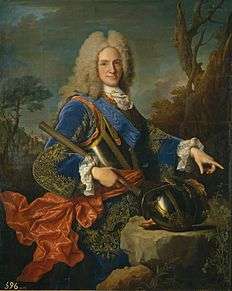 (1700–1724) |
| Manuel de Vadillo y Velasco | 15 April 1714 | 30 November 1714 | ||
| José de Grimaldo y Gutiérrez de Solórzano Marquis of Grimaldo (1st time) |
30 November 1714 | 14 January 1724 | ||
| Juan Bautista de Orendáin y Azpilicueta (1st time) |
14 January 1724 | 4 September 1724 | King Louis I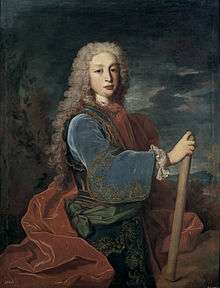 (1724) | |
| José de Grimaldo y Gutiérrez de Solórzano Marquis of Grimaldo (2nd time) |
4 September 1724 | 12 December 1725 | King Philip V (1724–1746) | |
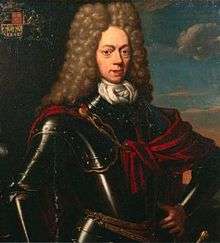 |
Juan Guillermo Ripperdá Duke and Baron of Ripperdá |
12 December 1725 | 14 April 1726 | |
_Pillars_of_Hercules_Variant.svg.png) |
José de Grimaldo y Gutiérrez de Solórzano Marquis of Grimaldo (3rd time) |
14 April 1726 | 1 October 1726 | |
| Juan Bautista de Orendáin y Azpilicueta Marquis of La Paz (2nd time) |
1 October 1726 | 21 November 1734 |
First Secretaries of State
| Picture | Name | From | Until | Monarch (Reign) |
|---|---|---|---|---|
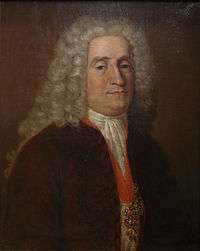 |
José de Patiño y Rosales | 21 November 1734 | 3 November 1736 | King Philip V (1724–1746) |
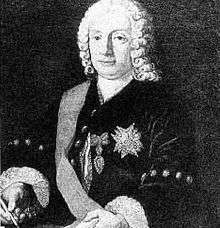 |
Sebastián de la Cuadra y Llerena 1st Marquis of Villarías |
26 November 1736 | 4 December 1746 | |
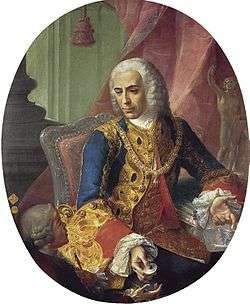 |
José de Carvajal y Lancaster | 4 December 1746 | 9 April 1754 | King Ferdinand VI (1746–1759) |
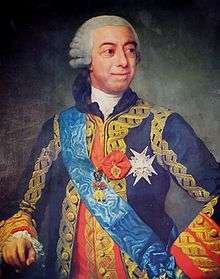 |
Fernando de Silva Mendoza y Toledo Duke of Hueścar |
9 April 1754 | 15 May 1754 | |
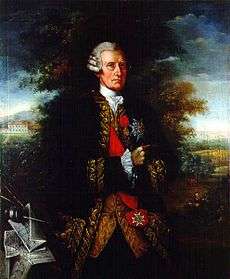 |
Ricardo Wall y Devreux | 15 May 1754 | 10 August 1759 | |
| 10 August 1759 | 9 October 1763 | King Charles III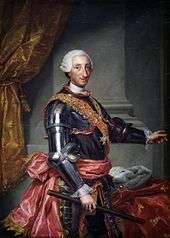 (1759–1788) | ||
 |
Pablo Jerónimo de Grimaldi y Pallavicini Duke of Grimaldi |
9 October 1763 | 19 February 1777 | |
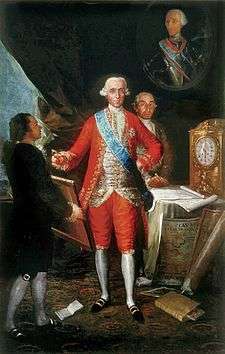 |
José Moñino y Redondo Count of Floridablanca |
19 February 1777 | 14 December 1788 | |
| 14 December 1788 | 28 February 1792 | King Charles IV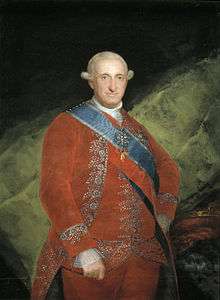 (1788–1808) | ||
 |
Pedro Pablo Abarca de Bolea y Ximénez de Urrea Count of Aranda Acting First Secretary of State |
28 February 1792 | 15 November 1792 | |
.jpg) |
Manuel de Godoy y Álvarez de Faria Duke of Alcudia |
15 November 1792 | 28 March 1798 | |
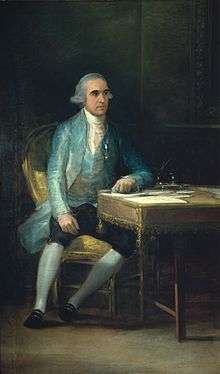 |
Francisco Saavedra de Sangronis Acting First Secretary of State until 6 September 1798 |
30 March 1798 | 21 February 1799 | |
_Pillars_of_Hercules_Variant.svg.png) |
Mariano Luis de Urquijo y Muga Acting First Secretary of State |
12 February 1799 | 13 December 1799 | |
| Pedro Cevallos Guerra (1st time) |
13 December 1799 | 3 March 1808 | ||
| Gonzalo O'Farrill y Herrera Acting First Secretary of State |
3 March 1808 | 19 March 1808 | ||
| Pedro Cevallos Guerra (2nd time) |
19 March 1808 | 7 July 1808 | King Ferdinand VII_by_Goya.jpg) (1808) | |
| Mariano Luis de Urquijo y Muga (2nd time) |
7 July 1808 | 27 June 1813 | King Joseph I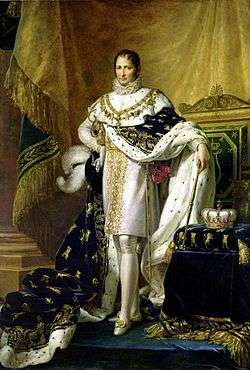 (1808–1813) | |
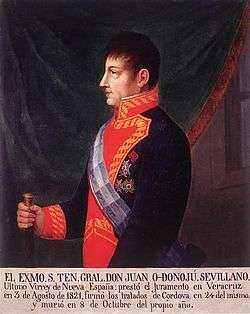 |
Juan O'Donoju O'Ryan Acting First Secretary of State |
10 October 1813 | 17 October 1813 | |
_Pillars_of_Hercules_Variant.svg.png) |
Fernando de Laserna Acting First Secretary of State |
17 October 1813 | 3 December 1813 | |
| José Luyando Acting First Secretary of State |
3 December 1813 | 4 May 1814 | King Ferdinand VII_by_Goya.jpg) (1813–1833) | |
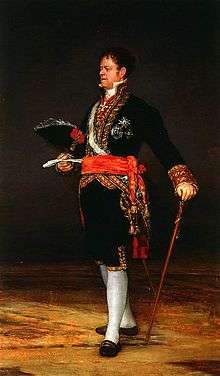 |
José Miguel de Carvajal-Vargas y Manrique de Lara Duke of San Carlos |
4 May 1814 | 15 November 1814 | |
_Pillars_of_Hercules_Variant.svg.png) |
Pedro Cevallos Guerra (3rd time) |
15 November 1814 | 24 January 1816 | |
| Juan Esteban Lozano de Torres | 24 January 1816 | 26 January 1816 | ||
| Pedro Cevallos Guerra (4th time) |
26 January 1816 | 30 October 1816 | ||
| José García de León y Pizarro | 30 October 1816 | 14 September 1818 | ||
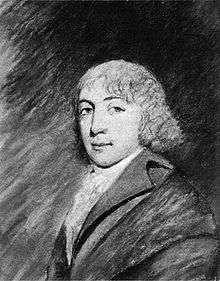 |
Carlos Martínez de Irujo y Tacón Marquis of Casa Irujo Acting First Secretary of State |
14 September 1818 | 12 June 1819 | |
_Pillars_of_Hercules_Variant.svg.png) |
Manuel González Salmón y Gómez de Torres Acting First Secretary of State |
12 June 1819 | 12 September 1819 | |
| Joaquín José Melgarejo y Saurín Duke of San Fernando de Quiroga |
12 September 1819 | 18 March 1820 | ||
| Juan Jabat Aztal Acting First Secretary of State |
18 March 1820 | |||
 |
Evaristo Pérez de Castro y Brito | 18 March 1820 | 2 March 1821 | |
_Pillars_of_Hercules_Variant.svg.png) |
Joaquín Anduaga Cuenca Acting First Secretary of State |
2 March 1821 | 23 April 1821 | |
| Francisco de Paula Escudero Acting First Secretary of State |
23 April 1821 | |||
| Eusebio Bardají y Azara | 23 April 1821 | 8 January 1822 | ||
| Ramón López Pelegrín Acting First Secretary of State |
8 January 1822 | 24 January 1822 | ||
| José Gabriel de Silva y Bazán Marquis of Santa Cruz |
24 January 1822 | 30 January 1822 | ||
| Ramón López Pelegrín Acting First Secretary of State |
30 January 1822 | 28 February 1822 | ||
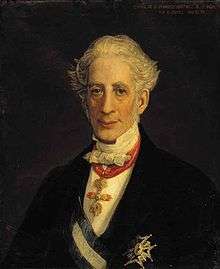 |
Francisco Martínez de la Rosa | 28 February 1822 | 5 August 1822 | |
_Pillars_of_Hercules_Variant.svg.png) |
Evaristo Fernández San Miguel y Valledor Acting First Secretary of State from 28 February 1822 |
5 August 1822 | 25 April 1823 | |
| José Manuel Vadillo Acting First Secretary of State |
25 April 1823 | 7 May 1823 | ||
| Santiago Usoz y Mozi Acting First Secretary of State |
7 May 1823 | 13 May 1823 | ||
| José María Pando de la Riva y Ramírez de Laredo | 13 May 1823 | 29 August 1823 | ||
| Luis María de Salazar y Salazar Acting First Secretary of State |
29 August 1823 | 4 September 1823 | ||
| Juan Antonio Yandiola Garay Acting First Secretary of State |
4 September 1823 | 6 September 1823 | ||
| José Luyando (2nd time) |
6 September 1823 | 1 October 1823 | ||
| Víctor Damián Sáez y Sánchez-Mayor Acting First Secretary of State until 7 August 1823 (counter-government until 1 October 1823.) |
25 April 1823 | 2 December 1823 | ||
 |
Carlos Martínez de Irujo y Tacón Marquis of Casa Irujo (2nd time) |
2 December 1823 | 18 January 1824 | |
| Narciso Fernández de Heredia y Begines de los Ríos Count of Ofalia |
18 January 1824 | 11 July 1824 | ||
_Pillars_of_Hercules_Variant.svg.png) |
Luis María de Salazar y Salazar Acting First Secretary of State |
11 July 1824 | ||
| Francisco Cea Bermúdez (1st time) |
11 July 1824 | 24 October 1825 | ||
.jpg) |
Pedro Alcantara Álvarez de Toledo y Salm Salm Duke of the Infantado |
24 October 1825 | 19 August 1826 | |
_Pillars_of_Hercules_Variant.svg.png) |
Manuel González Salmón y Gómez de Torres Acting First Secretary of State until 15 October 1830 |
19 August 1826 | 20 January 1832 | |
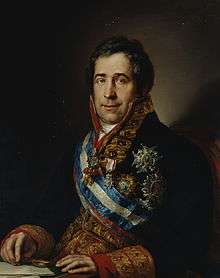 |
Francisco Tadeo Calomarde y Arría Acting First Secretary of State |
20 January 1832 | 22 February 1832 | |
_Pillars_of_Hercules_Variant.svg.png) |
Antonio de Saavedra y Frígola, conde de Alcudia Acting First Secretary of State |
22 February 1832 | 1 October 1832 | |
| José Cafranga Costilla Acting First Secretary of State |
1 October 1832 | 29 November 1832 | ||
| Francisco Cea Bermúdez (2nd time) |
29 November 1832 | 15 January 1834 | ||
Prime Ministers (Presidents of the Council of Ministers)
Political Persuasion: Moderate Progressive Liberal Union Radical Democratic
| Portrait | Name | Term of office | Political Party | Government | Monarch (Reign) | ||
|---|---|---|---|---|---|---|---|
 |
Francisco de Paula Martínez de la Rosa y Berdejo | 15 January 1834 | 7 June 1835 | Moderate Royalist | Martínez de la Rosa | Queen Dowager Maria Christina Regent for Queen Isabella II  (1833–1840) | |
.jpg) |
José María Queipo de Llano Ruiz de Saravia, 7th Count of Toreno | 7 June 1835 | 14 September 1835 | Toreno | |||
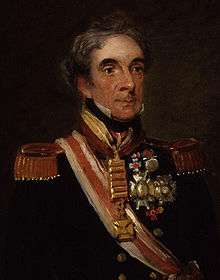 |
Miguel Ricardo de Álava y Esquivel (rejected his nomination, staying as the Spanish ambassador in London.) |
14 September 1835 | 25 September 1835 | Progressive | Álava | ||
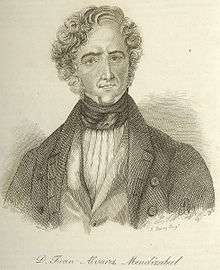 |
Juan Álvarez Mendizábal | 25 September 1835 | 15 May 1836 | Mendizábal | |||
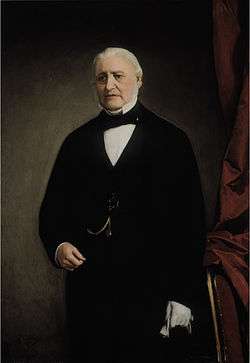 |
Francisco Javier Isturiz y Montero (1st time) |
15 May 1836 | 14 August 1836 | Moderate | Isturiz I | ||
 |
José María Calatrava y Peinado | 14 August 1836 | 18 August 1837 | Progressive | Calatrava | ||
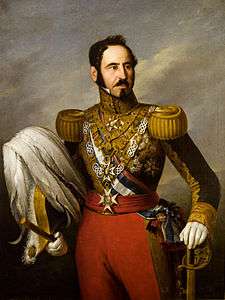 |
Baldomero Espartero, Count of Luchana (1st time) |
18 August 1837 | 18 October 1837 | Espartero I | |||
_Pillars_of_Hercules_Variant.svg.png) |
Eusebio Bardají y Azara | 18 October 1837 | 16 December 1837 | Moderate | Bardají | ||
| Narciso de Heredia y Begines de los Ríos, Count of Ofalia | 16 December 1837 | 6 September 1838 | Heredia | ||||
| Bernardino Fernández de Velasco, 14th Duke of Frías | 6 September 1838 | 9 December 1838 | Frías | ||||
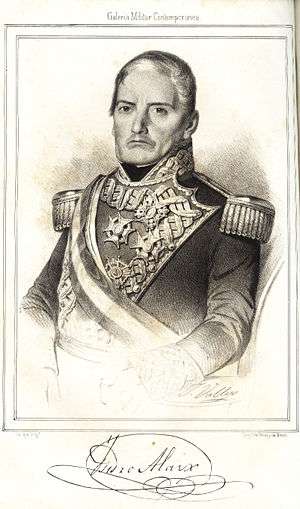 |
Isidro de Alaix Fábregas Acting Prime Minister |
9 December 1838 | 3 February 1839 | — | |||
 |
Evaristo Pérez de Castro y Brito | (9 December 1838) 3 February 1839 |
18 July 1840 | Pérez de Castro | |||
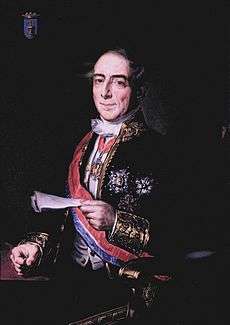 |
Antonio González y González (1st time) |
20 July 1840 | 12 August 1840 | Progressive | González I | ||
| Valentín Ferraz y Barrau | 12 August 1840 | 28 August 1840 | Ferraz | ||||
_Pillars_of_Hercules_Variant.svg.png) |
Modesto Cortázar Acting Prime Minister |
29 August 1840 | 11 September 1840 | — | |||
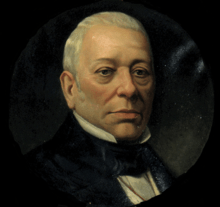 |
Vicente Sancho y Cobertores | 11 September 1840 | 16 September 1840 | Sancho | |||
 |
Baldomero Espartero, Duke of la Victoria (2nd time) |
16 September 1840 | 10 May 1841 | Progressive | Espartero II | Baldomero Espartero Regent for Queen Isabella II 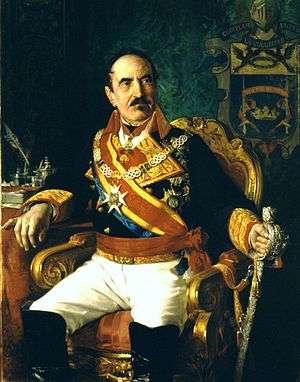 (1840–1843) | |
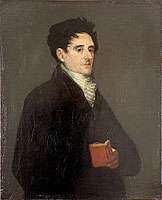 |
Joaquín María de Ferrer y Cafranga | 10 May 1841 | 20 May 1841 | Ferrer | |||
 |
Antonio González y González (2nd time) |
20 May 1841 | 17 June 1842 | González II | |||
.jpg) |
José Ramón Rodil y Campillo, Marquis of Rodil | 17 June 1842 | 9 May 1843 | Rodil | |||
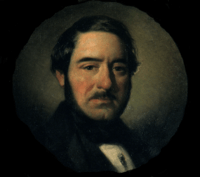 |
Joaquín María López y López (1st time) |
9 May 1843 | 19 May 1843 | López I | |||
.jpg) |
Álvaro Gómez Becerra | 19 May 1843 | 23 July 1843 | Gómez Becerra | |||
 |
Joaquín María López y López (2nd time) |
23 July 1843 | 20 November 1843 | López II | Queen Isabella II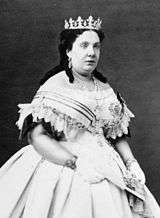 (1833/1843–1868) | ||
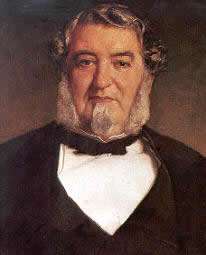 |
Salustiano de Olózaga y Almandoz | 20 November 1843 | 5 December 1843 | Olózaga | |||
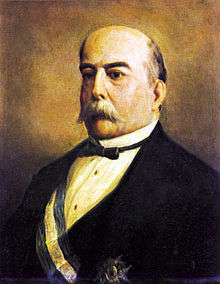 |
Luis González-Bravo y López de Arjona (1st time) |
5 December 1843 | 3 May 1844 | Moderate | González-Bravo | ||
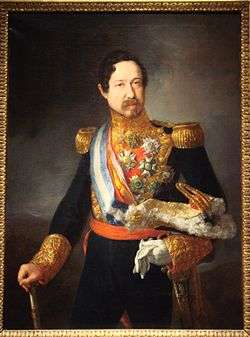 |
Ramón María Narváez, 1st Duke of Valencia (1st time) |
3 May 1844 | 12 February 1846 | Moderate | Década Moderada | ||
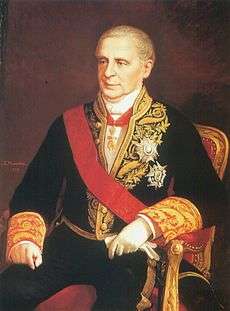 |
Manuel de Pando, 6th Marquis of Miraflores (1st time) |
12 February 1846 | 16 March 1846 | ||||
 |
Ramón María Narváez, 1st Duke of Valencia (2nd time) |
16 March 1846 | 5 April 1846 | ||||
 |
Francisco Javier Isturiz y Montero (2nd time) |
5 April 1846 | 28 January 1847 | ||||
 |
Carlos Martínez de Irujo Marquis of Casa Irujo, Duke of Sotomayor |
28 January 1847 | 28 March 1847 | ||||
 |
Joaquín Francisco Pacheco y Gutiérrez Calderón | 28 March 1847 | 31 August 1847 | ||||
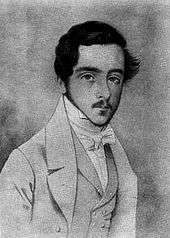 |
José de Salamanca y Mayol | 31 August 1847 | 12 September 1847 | ||||
_Pillars_of_Hercules_Variant.svg.png) |
Florencio García Goyena | 12 September 1847 | 4 October 1847 | ||||
 |
Ramón María Narváez, 1st Duke of Valencia (3rd time) |
4 October 1847 | 19 October 1849 | ||||
| Serafín María de Sotto, 3rd Count of Clonard (appointment revoked before he could take office.) |
19 October 1849 | 20 October 1849 | |||||
 |
Ramón María Narváez, 1st Duke of Valencia (4th time) |
20 October 1849 | 14 January 1851 | ||||
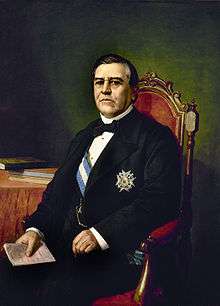 |
Juan Bravo Murillo | 14 January 1851 | 14 December 1852 | ||||
| Federico de Roncali, 1st Count of Alcoy | 14 December 1852 | 14 April 1853 | |||||
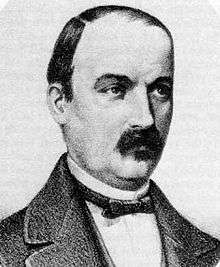 |
Francisco de Lersundi y Hormaechea | 14 April 1853 | 19 September 1853 | ||||
 |
Luis José Sartorius, 1st Count of San Luis | 19 September 1853 | 17 July 1854 | ||||
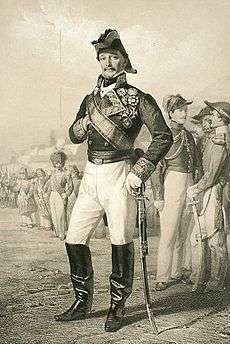 |
Fernando Fernández de Córdova | 17 July 1854 | 18 July 1854 | ||||
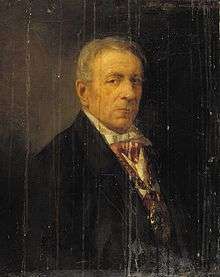 |
Ángel de Saavedra, 3rd Duke of Rivas | 18 July 1854 | 19 July 1854 | ||||
 |
Baldomero Espartero, Duke of la Victoria (3rd time) |
19 July 1854 | 14 July 1856 | Progressive | Bienio progresista | ||
 |
Leopoldo O'Donnell y Jorris (1st time) |
14 July 1856 | 12 October 1856 | Liberal Union | O'Donnell I | ||
 |
Ramón María Narváez, 1st Duke of Valencia (5th time) |
12 October 1856 | 15 October 1857 | Moderate | Narváez V | ||
 |
Francisco Armero y Peñaranda, 1st Marquis of Nervión | 15 October 1857 | 14 January 1858 | Nervión | |||
 |
Francisco Javier Isturiz y Montero (3rd time) |
14 January 1858 | 30 June 1858 | Isturiz III | |||
 |
Leopoldo O'Donnell y Jorris (2nd time) |
30 June 1858 | 2 March 1863 | Liberal Union | O'Donnell II O'Donnell III | ||
 |
Manuel de Pando, 6th Marquis of Miraflores (2nd time) |
2 March 1863 | 17 January 1864 | Moderate | Miraflores II | ||
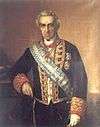 |
Lorenzo Arrazola y García | 17 January 1864 | 1 March 1864 | Arrazola | |||
 |
Alejandro Mon y Menéndez | 1 March 1864 | 16 September 1864 | Moderate | Mon | ||
 |
Ramón María Narváez, 1st Duke of Valencia (6th time) |
16 September 1864 | 21 June 1865 | Moderate | Narváez VI | ||
 |
Leopoldo O'Donnell y Jorris (3rd time) |
21 June 1865 | 10 July 1866 | Liberal Union | O'Donnell IV | ||
 |
Ramón María Narváez, 1st Duke of Valencia (7th time) |
10 July 1866 | 23 April 1868 | Moderate | Narváez VII | ||
 |
Luis González-Bravo y López de Arjona (2nd time) |
23 April 1868 | 19 September 1868 | Moderate | González-Bravo II | ||
 |
José Gutiérrez de la Concha, 1st Marquis of Havana | 19 September 1868 | 30 September 1868 | Moderate | Havana | ||
 |
Pascual Madoz Ibáñez Acting Prime Minister |
30 September 1868 | 3 October 1868 | Progressive | — | No formal Head of State | |
 |
Francisco Serrano y Domínguez, 1st Duke of La Torre (1st time) |
3 October 1868 | 18 June 1869 | Liberal Union | Serrano I | ||
 |
General Juan Prim y Prats, 1st Marquis of Los Castillejos | 18 June 1869 | 27 December 1870 (assassinated: died 30 December 1870) |
Progressist Liberal | Prim | Regent Francisco Serrano y Domínguez (1869–1870) | |
 |
Juan Bautista Topete y Carballo Acting Prime Minister |
27 December 1870 | 4 January 1871 | Liberal Union | — | King Amadeo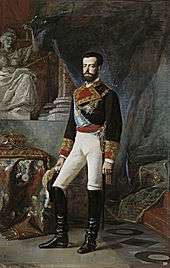 (1870–1873) | |
 |
Francisco Serrano y Domínguez, 1st Duke of La Torre (2nd time) |
4 January 1871 | 24 July 1871 | Serrano II | |||
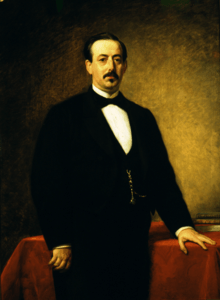 |
Manuel Ruiz Zorrilla (1st time) |
24 July 1871 | 5 October 1871 | Radical Democratic Party | Ruiz Zorrilla I | ||
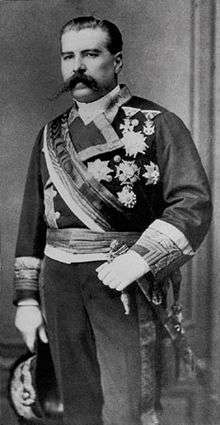 |
José Malcampo y Monge, 3rd Marquis of San Rafael | 5 October 1871 | 21 December 1871 | Democratic | Malcampo | ||
.jpg) |
Práxedes Mateo Sagasta (1st time) |
12 December 1871 | 26 May 1872 | Progressist Liberal | Sagasta I | ||
 |
Juan Bautista Topete y Carballo Acting Prime Minister |
26 May 1872 | 4 June 1872 | Liberal Union | — | ||
 |
Francisco Serrano y Domínguez, 1st Duke of La Torre (3rd time) |
4 June 1872 | 13 June 1872 | Serrano III | |||
 |
Fernando Fernández de Córdova, 2nd Marquis of Mendigorría Acting Prime Minister |
13 June 1872 | 16 June 1872 | Radical Democratic Party | — | ||
 |
Manuel Ruiz Zorrilla (2nd time) |
16 June 1872 | 12 February 1873 | Radical Democratic Party | Ruiz Zorrilla II | ||
First Spanish Republic (1873–1874)
Prime Ministers (Presidents of the Provisional Government)
Political Persuasion: Federal Republican Conservative faction Constitutional
| Portrait | Name | Term of office | Political Party | Government | Head of State (Term) | ||
|---|---|---|---|---|---|---|---|
 |
Estanislao Figueras y Moragas | 12 February 1873 | 11 June 1873 | Democratic Federal Republican Party | Figueras | Prime Minister was also Head of State | |
 |
Francesc Pi i Margall | 11 June 1873 | 18 July 1873 | Pi i Margall | |||
 |
Nicolás Salmerón Alonso | 18 July 1873 | 7 September 1873 | Salmerón | |||
 |
Emilio Castelar y Ripoll | 7 September 1873 | 4 January 1874 | Castelar | |||
 |
Francisco Serrano y Domínguez, 1st Duke of La Torre (4th time) |
4 January 1874 | 26 February 1874 | Conservative faction | Conservative republican dictatorship | ||
 |
Juan de Zavala y de la Puente, 1st Marquis of Sierra Bullones | 26 February 1874 | 3 September 1874 | ||||
.jpg) |
Práxedes Mateo Sagasta (2nd time) |
3 September 1874 | 30 December 1874 | Constitutional Party | Sagasta II | ||
↓Seville declares itself a Canton
The cantonal revolution starts
The cantonal revolution starts
↓Military coup by Gen. Pavía
↓Coup by Gen. Martínez Campos.
Monarchy restored in Alfonso XII
Monarchy restored in Alfonso XII
│
1873
│
1874
│
1875
Restoration Spain (1874–1931)
- Parties
| Colour key (for political parties) |
|---|
Dynastic Left
Liberal Democratic Party
Military
|
| Portrait | Name (Birth–Death) |
Term of office | Political Party | Government | Legislature | Monarch (Reign) | |||
|---|---|---|---|---|---|---|---|---|---|
| Took office | Left office | Days | |||||||
| Antonio Cánovas del Castillo (1828–1897) |
31 December 1874 | 10 January 1875 | 255 | Alfonsine Party | Ministry-Regency | —— | —— | ||
| 10 January 1875 | 12 September 1875 | Cánovas I | —— | King Alfonso XII (1874–1885) | |||||
| First time. President of the Minister-Regency until King Alfonso XII's return from exile. | |||||||||
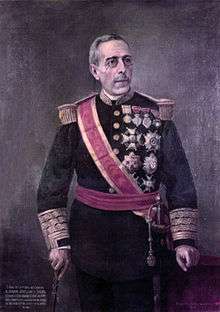 |
Joaquín Jovellar (1819–1892) |
12 September 1875 | 3 December 1875 | 82 | Alfonsine Party | Jovellar | —— | ||
| Named to the post to organize the 1876 election. | |||||||||
| Antonio Cánovas del Castillo (1828–1897) |
3 December 1875 | 15 February 1876 | 1191 | Conservative Party | Cánovas II | —— | |||
| 15 February 1876 | 8 March 1879 | I (1876) | |||||||
| Second time. Spanish Constitution of 1876. End of Third Carlist War. 1877 Electoral Law. 1878 Pact of Zanjón; end of Ten Years' War. 1878 Electoral Law. | |||||||||
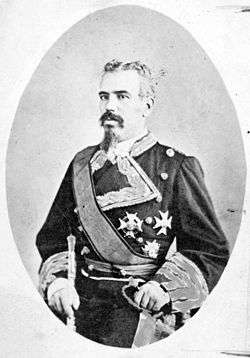 |
Arsenio Martínez Campos (1831–1900) |
8 March 1879 | 1 June 1879 | 278 | Conservative Party | Martínez Campos | I (——) | ||
| 1 June 1879 | 11 December 1879 | II (1879) | |||||||
| Proposed for the post by Cánovas del Castillo. | |||||||||
| Antonio Cánovas del Castillo (1828–1897) |
11 December 1879 | 10 February 1881 | 427 | Conservative Party | Cánovas III | II (——) | |||
| Third time. Build up of Restoration system of turnismo. | |||||||||
.jpg) |
Práxedes Mateo Sagasta (1825–1903) |
10 February 1881 | 20 September 1881 | 976 | Liberal Party | Sagasta I | II (——) | ||
| 20 September 1881 | 14 October 1883 | III (1881) | |||||||
| First time under Restoration system; third overall. First turno PM. 1882 Electoral Law. Advances in press freedom and labour movement claims. | |||||||||
 |
José Posada Herrera (1814–1885) |
14 October 1883 | 20 January 1884 | 98 | Dynastic Left | Posada | III (——) | ||
| Resigned due to opposition from Sagasta's supporters. | |||||||||
| Antonio Cánovas del Castillo (1828–1897) |
20 January 1884 | 20 May 1884 | 678 | Conservative Party | Cánovas IV | III (——) | |||
| 20 May 1884 | 28 November 1885 | IV (1884) | |||||||
| Fourth time. Start of 1885 Caroline Crisis. 1885 Pact of El Pardo and subsequent death of King Alfonso XII. | |||||||||
.jpg) |
Práxedes Mateo Sagasta (1825–1903) |
28 November 1885 | 10 May 1886 | 1683 | Liberal Party | Sagasta II | IV (——) | Queen Dowager Maria Christina Regent for King Alfonso XIII  (1886–1902) | |
| 10 May 1886 | 16 June 1888 | V (1886) | |||||||
| 16 June 1888 | 12 December 1888 | Sagasta III | |||||||
| 12 December 1888 | 22 January 1890 | Sagasta IV | |||||||
| 22 January 1890 | 8 July 1890 | Sagasta V | |||||||
| Second time under Restoration system; fourth overall. Longest Restoration Legislature. End of 1885 Caroline Crisis. Abolition of slavery in Cuba. 1887 Law regulating right of association; legalization of trade unions. 1888 Barcelona Universal Exposition. 1889 amnesty law for electoral crimes. 1890 Electoral Law. | |||||||||
| Antonio Cánovas del Castillo (1828–1897) |
8 July 1890 | 2 March 1891 | 889 | Conservative Party | Cánovas V | V (——) | |||
| 2 March 1891 | 24 November 1891 | VI (1891) | |||||||
| 24 November 1891 | 13 December 1892 | Cánovas VI | |||||||
| Fifth time. Weyler campaign in Mindanao. Resigned after Silvela's rebellion. | |||||||||
.jpg) |
Práxedes Mateo Sagasta (1825–1903) |
13 December 1892 | 5 April 1893 | 831 | Liberal Party | Sagasta VI | VI (——) | ||
| 5 April 1893 | 13 March 1894 | VII (1893) | |||||||
| 13 March 1894 | 5 November 1894 | Sagasta VII | |||||||
| 5 November 1894 | 24 March 1895 | Sagasta VIII | |||||||
| Third time under Restoration system; fifth overall. Start of Cuban War of Independence. | |||||||||
| Antonio Cánovas del Castillo (1828–1897) |
24 March 1895 | 11 May 1896 | 868 | Conservative Party | Cánovas VII | VII (——) | |||
| 11 May 1896 | 8 August 1897† | VIII (1896) | |||||||
| Sixth time. 1896 Corpus procession bombing. Assassinated by Italian anarchist Michele Angiolillo. | |||||||||
 |
Marcelo Azcárraga (1832–1915) |
8 August 1897 | 22 August 1897 | 58 | Conservative Party | Cánovas VIII (interim) | VIII (——) | ||
| 22 August 1897 | 5 October 1897 | Azcárraga I | |||||||
| First time. Served as interim PM after Cánovas' assassination. Appointed officeholder as provisional PM on 22 August 1897. | |||||||||
.jpg) |
Práxedes Mateo Sagasta (1825–1903) |
5 October 1897 | 21 May 1898 | 518 | Liberal Party | Sagasta IX | VIII (——) | ||
| 21 May 1898 | 7 March 1899 | Sagasta X | IX (1898) | ||||||
| Fourth time under Restoration system; sixth overall. Spanish–American War; 1898 Treaty of Paris. 1899 German–Spanish Treaty. | |||||||||
| Francisco Silvela (1843–1905) |
7 March 1899 | 2 June 1899 | 596 | Conservative Party | Silvela I | IX (——) | |||
| 2 June 1899 | 19 April 1900 | X (1899) | |||||||
| 19 April 1900 | 24 October 1900 | Silvela II | |||||||
| First time. Regenerationist reforms. Issues with Public Treasury leading to government's downfall. | |||||||||
 |
Marcelo Azcárraga (1832–1915) |
24 October 1900 | 7 March 1901 | 134 | Conservative Party | Azcárraga II | X (——) | ||
| Second time. Named to the post to organize the 1901 election. | |||||||||
.jpg) |
Práxedes Mateo Sagasta (1825–1903) |
7 March 1901 | 11 June 1901 | 643 | Liberal Party | Sagasta XI | X (——) | ||
| 11 June 1901 | 20 March 1902 | XI (1901) | |||||||
| 20 March 1902 | 17 May 1902 | Sagasta XII | |||||||
| 17 May 1902 | 20 November 1902 | Sagasta XIII | King Alfonso XIII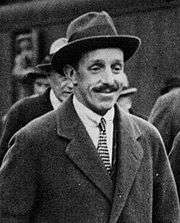 (1886/1902–1931) | ||||||
| 20 November 1902 | 10 December 1902 | Sagasta XIV | |||||||
| Fifth time under Restoration system; seventh overall. | |||||||||
| Francisco Silvela (1843–1905) |
10 December 1902 | 18 May 1903 | 223 | Conservative Party | Silvela III | XI (——) | |||
| 18 May 1903 | 21 July 1903 | XII (1903) | |||||||
| Second time. Retirement from politics. | |||||||||
 |
Raimundo Fernández Villaverde (1848–1905) |
21 July 1903 | 8 December 1903 | 140 | Conservative Party | Villaverde I | XII (——) | ||
| First time. | |||||||||
_b.jpg) |
Antonio Maura (1853–1925) |
8 December 1903 | 17 December 1904 | 375 | Conservative Party | Maura I | XII (——) | ||
| First time. 1904 assassination attempt. | |||||||||
 |
Marcelo Azcárraga (1832–1915) |
17 December 1904 | 28 January 1905 | 42 | Conservative Party | Azcárraga III | XII (——) | ||
| Third time. | |||||||||
 |
Raimundo Fernández Villaverde (1848–1905) |
28 January 1905 | 24 June 1905 | 147 | Conservative Party | Villaverde II | XII (——) | ||
| Second time. | |||||||||
 |
Eugenio Montero Ríos (1832–1914) |
24 June 1905 | 1 November 1905 | 162 | Liberal Party | Montero I | XII (——) | ||
| 1 November 1905 | 3 December 1905 | Montero II | XIII (1905) | ||||||
| ¡Cu-Cut! incident. King Alfonso XIII's lack of support on Montero's stance against the military prompted his resignation. | |||||||||
.jpg) |
Segismundo Moret (1833–1913) |
3 December 1905 | 7 July 1906 | 216 | Liberal Party | Moret I | XIII (——) | ||
| First time. 1906 Jurisdiction Law. 1906 assassination attempt on King Alfonso XIII leading to his resignation. | |||||||||
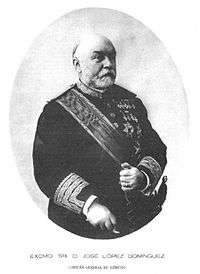 |
José López Domínguez (1829–1911) |
7 July 1906 | 1 December 1906 | 147 | Liberal Party | López Dominguez | XIII (——) | ||
| After a little over four months into office, Moret forced his resignation. | |||||||||
.jpg) |
Segismundo Moret (1833–1913) |
1 December 1906 | 5 December 1906 | 4 | Liberal Party | Moret II | XIII (——) | ||
| Second time. Papelito crisis; Subject to censure vote that led to his resignation. | |||||||||
 |
Antonio González de Aguilar (1824–1908) |
5 December 1906 | 26 January 1907 | 52 | Liberal Party | Aguilar | XIII (——) | ||
| 1907 budget. | |||||||||
_b.jpg) |
Antonio Maura (1853–1925) |
26 January 1907 | 13 May 1907 | 1000 | Conservative Party | Maura II | XIII (——) | ||
| 13 May 1907 | 22 October 1909 | XIV (1907) | |||||||
| Second time. "Long Government". 1907 Electoral Law. National Insurance Institute. Second Melillan campaign (1909). 1909 Tragic Week. | |||||||||
.jpg) |
Segismundo Moret (1833–1913) |
22 October 1909 | 10 February 1910 | 111 | Liberal Party | Moret III | XIV (——) | ||
| Third time. | |||||||||
 |
José Canalejas (1854–1912) |
10 February 1910 | 15 June 1910 | 1006 | Liberal Party | Canalejas I | XIV (——) | ||
| 15 June 1910 | 3 January 1911 | XV (1910) | |||||||
| 3 January 1911 | 4 April 1911 | Canalejas II | |||||||
| 4 April 1911 | 12 November 1912† | Canalejas III | |||||||
| Establishment of compulsory military service. 1910 limiting of religious congregation establishments by "Padlock Law". 1912 Spanish railway strike. Assassinated by Spanish anarchist Manuel Pardiñas. | |||||||||
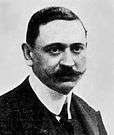 |
Manuel García Prieto (1859–1938) |
12 November 1912 | 15 November 1912 | 3 | Liberal Party | Canalejas III (interim) | XV (——) | ||
| First time. Served as interim PM after Canalejas' assassination. | |||||||||
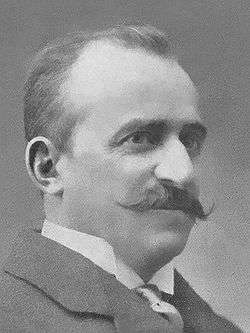 |
Álvaro Figueroa (1863–1950) |
15 November 1912 | 1 January 1913 | 347 | Liberal Party | Figueroa I | XV (——) | ||
| 1 January 1913 | 28 October 1913 | Figueroa II | |||||||
| First time. 1912 French–Spanish Treaty; Spanish protectorate in Morocco. | |||||||||
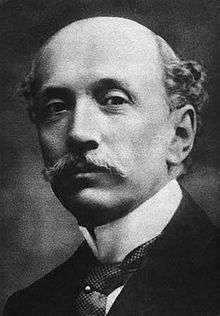 |
Eduardo Dato (1856–1921) |
28 October 1913 | 2 April 1914 | 773 | Conservative Party | Dato I | XV (——) | ||
| 2 April 1914 | 10 December 1915 | XVI (1914) | |||||||
| First time. Establishment of Catalan Management Community in 1913. Breakout of First World War in Europe. | |||||||||
 |
Álvaro Figueroa (1863–1950) |
10 December 1915 | 10 May 1916 | 497 | Liberal Party | Figueroa III | XVI (——) | ||
| 10 May 1916 | 20 April 1917 | XVII (1916) | |||||||
| Second time. | |||||||||
 |
Manuel García Prieto (1859–1938) |
20 April 1917 | 12 June 1917 | 53 | Liberal Democratic Party | García Prieto I | XVII (——) | ||
| Second time. | |||||||||
 |
Eduardo Dato (1856–1921) |
12 June 1917 | 4 November 1917 | 145 | Conservative Party | Dato II | XVII (——) | ||
| Second time. Spanish Crisis of 1917. | |||||||||
 |
Manuel García Prieto (1859–1938) |
4 November 1917 | 23 March 1918 | 139 | Liberal Democratic Party | García Prieto II | XVII (——) | ||
| Third time. | |||||||||
_b.jpg) |
Antonio Maura (1853–1925) |
23 March 1918 | 10 November 1918 | 232 | Conservative Party | Maura III | XVIII (1918) | ||
| Third time. | |||||||||
 |
Manuel García Prieto (1859–1938) |
10 November 1918 | 6 December 1918 | 26 | Liberal Democratic Party | García Prieto III | XVIII (——) | ||
| Fourth time. | |||||||||
 |
Álvaro Figueroa (1863–1950) |
6 December 1918 | 16 April 1919 | 131 | Liberal Party | Figueroa IV | XVIII (——) | ||
| Third time. | |||||||||
_b.jpg) |
Antonio Maura (1853–1925) |
16 April 1919 | 21 July 1919 | 96 | Conservative Party | Maura IV | XVIII (——) | ||
| Fourth time. | |||||||||
| Joaquín Sánchez de Toca (1852–1942) |
21 July 1919 | 13 December 1919 | 145 | Conservative Party | Sánchez de Toca | XIX (1919) | |||
| Tasked with forming a government after Maura's failure to form a national unity cabinet. | |||||||||
 |
Manuel Allendesalazar (1856–1923) |
13 December 1919 | 6 May 1920 | 145 | Conservative Party | Allendesalazar I | XIX (——) | ||
| First time. | |||||||||
 |
Eduardo Dato (1856–1921) |
6 May 1920 | 4 January 1921 | 306 | Conservative Party | Dato III | XIX (——) | ||
| 4 January 1921 | 8 March 1921† | XX (1920) | |||||||
| Third time. Start of Rif War. Assassinated by Spanish anarchist Pedro Mateu. | |||||||||
| Gabino Bugallal (1861–1932) |
8 March 1921 | 14 March 1921 | 6 | Conservative Party | Dato III (interim) | XX (——) | |||
| Served as interim PM after Dato's assassination. | |||||||||
 |
Manuel Allendesalazar (1856–1923) |
14 March 1921 | 15 August 1921 | 154 | Conservative Party | Allendesalazar II | XX (——) | ||
| Second time. 1921 Disaster of Annual. | |||||||||
_b.jpg) |
Antonio Maura (1853–1925) |
15 August 1921 | 9 March 1922 | 206 | Conservative Party | Maura V | XX (——) | ||
| Fifth time. | |||||||||
 |
José Sánchez-Guerra (1859–1935) |
9 March 1922 | 8 December 1922 | 274 | Conservative Party | Sánchez-Guerra | XX (——) | ||
| Picasso report. | |||||||||
 |
Manuel García Prieto (1859–1938) |
8 December 1922 | 23 May 1923 | 282 | Liberal Democratic Party | García Prieto IV | XX (——) | ||
| 23 May 1923 | 16 September 1923 | XXI (1923) | |||||||
| Fifth time. 1923 Primo de Rivera's coup d'etat. | |||||||||
 |
Miguel Primo de Rivera (1870–1930) |
16 September 1923 | 4 December 1925 | 2329 | Spanish Patriotic Union | Military Directory | Directory | ||
| 4 December 1925 | 31 January 1930 | Civil Directory | |||||||
| Military dictatorship. 1925 Alhucemas landing. 1926 coup d'etat attempt. 1929 Ibero-American Exposition. 1929 Barcelona International Exposition. 1929 economic crisis. | |||||||||
 |
Dámaso Berenguer (1873–1953) |
31 January 1930 | 19 February 1931 | 384 | Military | Berenguer | —— | ||
| Dictablanda. 1930 Pact of San Sebastián. 1930 Jaca Uprising. | |||||||||
 |
Juan Bautista Aznar-Cabañas (1860–1933) |
19 February 1931 | 14 April 1931 | 54 | Military | Aznar-Cabañas | —— | ||
| Dictablanda. 1931 municipal elections. Establishment of Second Spanish Republic and a Provisional Government. | |||||||||
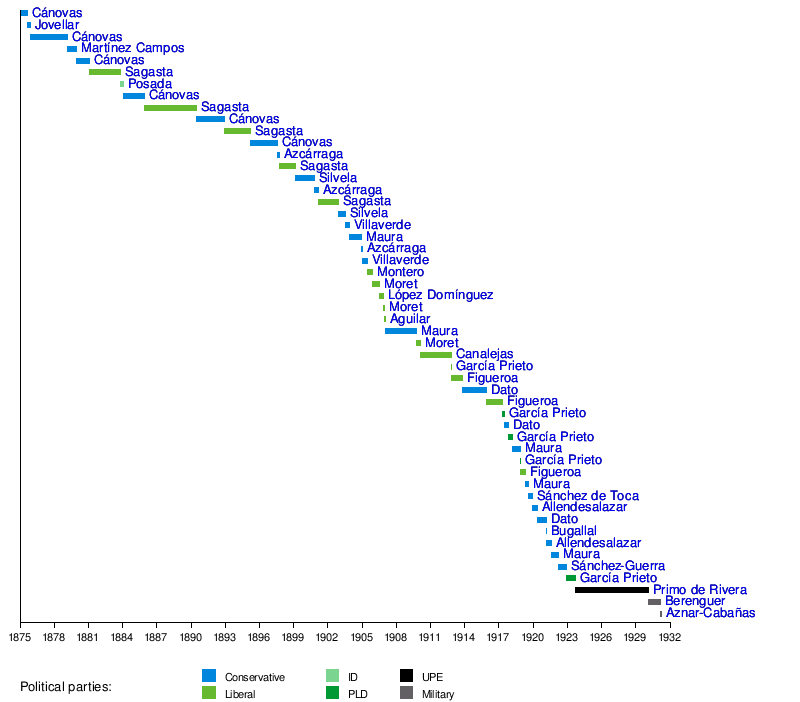
Second Spanish Republic (1931–1939)
- Parties
| Colour key (for political parties) |
|---|
| Portrait | Name (Birth–Death) |
Term of office | Political Party | Government | Legislature | President (Term) | |||
|---|---|---|---|---|---|---|---|---|---|
| Took office | Left office | Days | |||||||
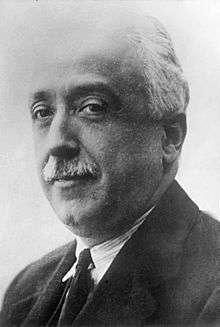 |
Niceto Alcalá-Zamora (1877–1949) |
15 April 1931 | 15 October 1931 | 183 | Liberal Republican Right | Alcalá-Zamora | Provisional | —— | |
| President of the Provisional Government. Writing of the Spanish Constitution of 1931. 1931 Burning of Convents. | |||||||||
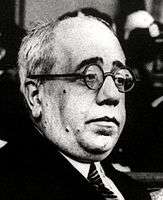 |
Manuel Azaña (1880–1940) |
15 October 1931 | 17 December 1931 | 699 | Republican Action | Azaña I | Provisional | ||
| 17 December 1931 | 13 June 1933 | Azaña II | I (1931) | Niceto Alcalá-Zamora (1931–1936) | |||||
| 13 June 1933 | 13 September 1933 | Azaña III | |||||||
| 1931–33 "Reformist Biennium". Spanish Constitution of 1931 adopted. 1932 coup d'état attempt. 1932 Catalonia Statute of Autonomy. 1933 Casas Viejas incident. Extension of suffrage to women in 1933. 1933 Law Confessions and Religious Congregations Law. Growing parliamentary opposition resulted in his dismissal by President Alcalá-Zamora. | |||||||||
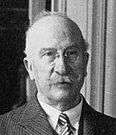 |
Alejandro Lerroux (1864–1949) |
13 September 1933 | 9 October 1933 | 26 | Radical Republican Party | Lerroux I | I (——) | ||
| Named to the post after Azaña's resignation. Resigned after failing to form a stable government. | |||||||||
| Diego Martínez Barrio (1883–1962) |
9 October 1933 | 17 December 1933 | 69 | Radical Republican Party | Martínez Barrio I | I (——) | |||
| Named to the post to organize the 1933 election. | |||||||||
 |
Alejandro Lerroux (1864–1949) |
17 December 1933 | 4 March 1934 | 133 | Radical Republican Party | Lerroux II | II (1933) | ||
| 4 March 1934 | 29 April 1934 | Lerroux III | |||||||
| Start of the 1933–35 "Conservative Biennium". Elected to the post after reaching a parliamentary agreement with the Spanish Confederation of the Autonomous Right (CEDA). Resigned after Alcalá-Zamora's refusal to sign an amnesty decree for the military personnel involved in the 1932 coupt d'etat attempt. | |||||||||
| Ricardo Samper (1881–1938) |
29 April 1934 | 5 October 1934 | 159 | Radical Republican Party | Samper | II (——) | |||
| Succeeded Lerroux after his resignation. Served for a few months before the CEDA withdrew support from him because of his perceived weakness to deal with social problems. | |||||||||
 |
Alejandro Lerroux (1864–1949) |
5 October 1934 | 4 April 1935 | 356 | Radical Republican Party | Lerroux IV | II (——) | ||
| 4 April 1935 | 7 May 1935 | Lerroux V | |||||||
| 7 May 1935 | 26 September 1935 | Lerroux VI | |||||||
| CEDA's entry into the government. Revolution of 1934, 1934 Asturian miners' strike and Events of October the 6th. Suspension of the Catalonia Statute of Autonomy. Resigned because of the 1935 Straperlo scandal. | |||||||||
 |
Joaquín Chapaprieta (1871–1951) |
26 September 1935 | 15 December 1935 | 80 | Independent | Chapaprieta | II (——) | ||
| Succeeded Lerroux. Served for a few months before resigning as a result of the CEDA and the PRR withdrawing support from the government. | |||||||||
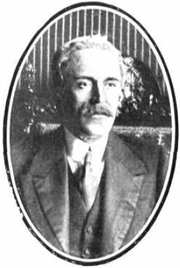 |
Manuel Portela Valladares (1867–1952) |
15 December 1935 | 31 December 1936 | 67 | Independent | Portela I | II (——) | ||
| 31 December 1935 | 20 February 1936 | Portela II | |||||||
| Named to the post to organize the 1936 election. | |||||||||
 |
Manuel Azaña (1880–1940) |
20 February 1936 | 8 April 1936 | 81 | Republican Left | Azaña IV | III (1936) | ||
| 8 April 1936 | 11 May 1936 | Azaña V | |||||||
| Elected to the post after the Popular Front victory in the 1936 election. Left the office to become President of the Republic. | |||||||||
.svg.png) |
Augusto Barcía Trelles (1881–1961) |
11 May 1936 | 13 May 1936 | 2 | Republican Left | Azaña V (interim) | III (——) | Manuel Azaña (1936–1939) | |
| Interim PM after Azaña's resignation. | |||||||||
| Santiago Casares Quiroga (1884–1950) |
13 May 1936 | 19 July 1936 | 67 | Republican Left | Casares Quiroga | III (——) | |||
| Spanish coup of July 1936. Start of 1936–39 Spanish Civil War and 1936–37 Spanish Revolution. Resigned after not being able to acknowledge the threat of the coup in time. | |||||||||
| Diego Martínez Barrio (1883–1962) |
19 July 1936 | 20 July 1936 | 1 | Republican Union | Martínez Barrio II | III (——) | |||
| Named to the post in order to convince coup leaders to stand down their weapons and surrender. Resigned after realizing that civil war was inevitable. | |||||||||
 |
José Giral (1879–1962) |
20 July 1936 | 5 September 1936 | 47 | Republican Left | Giral | III (——) | ||
| 1936 Siege of the Alcázas and Extremaduran and Gipuzkoa campaigns. | |||||||||
.jpg) |
Francisco Largo Caballero (1869–1946) |
5 September 1936 | 5 November 1936 | 255 | Spanish Socialist Workers' Party | Caballero I | III (——) | ||
| 5 November 1936 | 18 May 1937 | Caballero II | |||||||
| 1936 Siege of Madrid. 1937 Battles of Jarama and Guadalajara, Biscay Campaign, start of the War in the North. 1937 May Days. | |||||||||
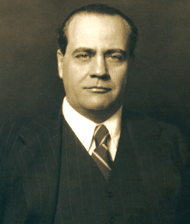 |
Juan Negrín (1892–1956) |
18 May 1937 | 6 April 1938 | 682 | Spanish Socialist Workers' Party | Negrín I | III (——) | ||
| 6 April 1938 | 31 March 1939 | Negrín II | |||||||
| August Crisis. 1937 Battles of Belchite and Brunete. 1937 Asturias and Zaragoza Offensives. 1937–38 Battle of Teruel. 1938 Aragon and Levante Offensives. Thirteenth Points of Negrín. 1938 Battle of the Ebro. 1938–39 Battle of the Segre. 1939 Catalonia and Final Offensives. Segismundo Casado's coup d'etat. | |||||||||
.svg.png) |
José Miaja (1878–1958) |
13 March 1939 | 28 March 1939 | 15 | Military | National Defense Council | National Defense Council | José Miaja (1939) | |
| Took power after 1939 coup d'etat to negotiate a surrender with Franco. Republican faction surrender and end of the Civil War. | |||||||||

Spanish Republican government in exile (1939–1977)
- Juan Negrín (31 March 1939 – 17 August 1945), Spanish Socialist Workers' Party
- José Giral (17 August 1945 – 9 February 1947), Republican Left
- Rodolfo Llopis (9 February 1947 – 8 August 1947), Spanish Socialist Workers' Party
- Álvaro de Albornoz (8 August 1947 – 30 November 1930), Republican Union
- Felix Gordón (13 August 1951 – 17 April 1960), Republican Union
- Emilio Herrera (9 May 1960 – 28 February 1962), Independent
- Claudio Sánchez-Albornoz (28 February 1962 – 28 February 1971), Republican Union
- Fernando Valera (28 February 1971 – 21 June 1977), Republican Union
Francoist Spain (1936–1975)
- Parties
| Colour key (for political parties) |
|---|
Military
|
| Portrait | Name (Birth–Death) |
Term of office | Political Party | Government | Legislature | Head of State (Term) | |||
|---|---|---|---|---|---|---|---|---|---|
| Took office | Left office | Days | |||||||
-Bureaucratic_Variant.svg.png) |
Miguel Cabanellas (1872–1938) |
25 July 1936 | 30 September 1936 | 67 | Military | National Defense Junta | —— | —— | |
| Named President of the National Defence Junta of the Nationalist side during the Civil War. | |||||||||
| Francisco Franco (1892–1975) |
30 September 1936 | 31 January 1938 | 13401 | Falange | State Technical Junta | National Council of the Movement | Caudillo Francisco Franco (1936–1975) | ||
| 31 January 1938 | 11 August 1939 | Franco I | |||||||
| 11 August 1939 | 20 May 1941 | Franco II | |||||||
| 20 May 1941 | 4 September 1942 | Franco III | |||||||
| 4 September 1942 | 21 July 1945 | Franco IV | I (1943) II (1946) III (1949) IV (1952) V (1955) VI (1958) VII (1961) VIII (1964) IX (1967) X (1971) | ||||||
| 21 July 1945 | 20 July 1951 | Franco V | |||||||
| 20 July 1951 | 16 February 1956 | Franco VI | |||||||
| 16 February 1956 | 26 February 1957 | Franco VII | |||||||
| 26 February 1957 | 11 July 1962 | Franco VIII | |||||||
| 11 July 1962 | 8 July 1965 | Franco IX | |||||||
| 8 July 1965 | 22 September 1967 | Franco X | |||||||
| 22 September 1967 | 30 October 1969 | Franco XI | |||||||
| 30 October 1969 | 9 June 1973 | Franco XII | |||||||
| Spanish Civil War: defeated the Republicans in 1939, established Francoist Spain. Establishment of an autocratic one-party military dictatorship. White Terror. Fundamental Laws of the Realm. Spanish Miracle 1959–74. Named Prince Juan Carlos de Bourbon as heir apparent in 1969. Franco died on 20 November 1975. | |||||||||
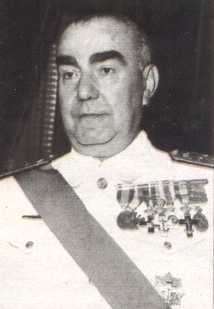 |
Luis Carrero Blanco (1904–1973) |
9 June 1973 | 20 December 1973† | 194 | Falange | Carrero | X (——) | ||
| Assassinated by ETA members only 6 months into office. | |||||||||
.svg.png) |
Torcuato Fernández-Miranda (1915–1980) |
20 December 1973 | 31 December 1973 | 11 | Falange | Carrero (interim) | X (——) | ||
| Served as interim PM after Carrero Blanco's assassination. | |||||||||
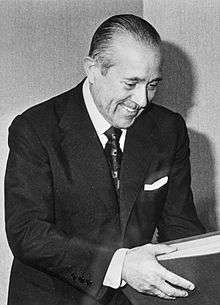 |
Carlos Arias Navarro (1908–1989) |
31 December 1973 | 11 March 1975 | 711 | Falange | Arias I | X (——) | ||
| 11 March 1975 | 12 December 1975 | Arias II | |||||||
| Appointed to the office as a result of the assassination of Luis Carrero Blanco, Contrary to political liberalization. Garroting of Catalan anarchist Salvador Puig Antich. Green March (1975). | |||||||||

Kingdom of Spain (1975–present)
- Parties
| Colour key (for political parties) |
|---|
| Portrait | Name (Birth–Death) |
Term of office | Political Party | Government | Legislature | Monarch (Reign) | |||
|---|---|---|---|---|---|---|---|---|---|
| Took office | Left office | Days | |||||||
 |
Carlos Arias Navarro (1908–1989) |
12 December 1975 | 2 July 1976 | 203 | Falange | Arias III | —— | King Juan Carlos I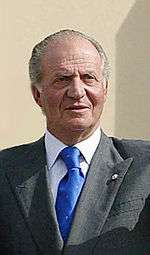 (1975–2014) | |
| Instructed by King Juan Carlos I to enact reforms for the regime's opening towards democracy after Franco's death in 1975. Contrary to any change, resigned as a result of a power struggle with the King over political reform. | |||||||||
.svg.png) |
Fernando de Santiago (1910–1994) |
2 July 1976 | 5 July 1976 | 3 | Military | Arias III (interim) | —— | ||
| Served as interim PM after Arias Navarro's resignation. | |||||||||
.jpg) |
Adolfo Suárez (1932–2014) |
5 July 1976 | 5 July 1977 | 1697 | Falange | Suárez I | —— | ||
| 5 July 1977 | 2 April 1979 | Union of the Democratic Centre | Suárez II | Constituent (1977) | |||||
| 2 April 1979 | 26 February 1981 | Suárez III | I (1979) | ||||||
| Appointed in 1976 by King Juan Carlos I after Arias Navarro's resignation. Led Spain through the country's transition to democracy. 1976 political reform referendum. 1977 Massacre of Atocha. Legalization of the PCE. In 1977 became the first democratically-elected PM in 40 years. 1978 Moncloa Pact. 1978 constitutional referendum; Spanish Constitution of 1978 adopted. Early 1980s recession. 1980 unsuccessful censure motion. Resigned due to loss of party support. | |||||||||
.jpg) |
Leopoldo Calvo-Sotelo (1926–2008) |
26 February 1981 | 2 December 1982 | 644 | Union of the Democratic Centre | Calvo-Sotelo | I (——) | ||
| Succeeded Suárez mid-term. 1981 failed coup d'état (23-F) during investiture. Legalization of divorce in 1981. Spain's entry into NATO (1981). Change of national flag. Disintegration of UCD. 1982 coup d'état attempt. | |||||||||
.jpg) |
Felipe González (b. 1942) |
2 December 1982 | 24 July 1986 | 4903 | Spanish Socialist Workers' Party | González I | II (1982) | ||
| 24 July 1986 | 6 December 1989 | González II | III (1986) | ||||||
| 6 December 1989 | 10 July 1993 | González III | IV (1989) | ||||||
| 10 July 1993 | 5 May 1996 | González IV | V (1993) | ||||||
| Four consecutive terms. Longest-serving democratically-elected Spanish PM. Legalization of abortion in 1985. 1985 El Descanso bombing. Reorganization of education system. Establishment of welfare state. Spanish NATO membership referendum, 1986. Spain EEC membership. 1987 unsuccessful censure motion. 1987 Hipercor bombing. 1988 Spanish general strike. Legalization of private TV channels. Signing of 1992 Maastricht Treaty. 1992 Barcelona Olympics and Seville Expo '92. 1993 economic crisis. Signing of 1993 EEA Agreement. 1995 Toledo Pact. Mid–1990s PSOE corruption scandals (Filesa, Luis Roldán, GAL). | |||||||||
.jpg) |
José María Aznar (b. 1953) |
5 May 1996 | 27 April 2000 | 2904 | People's Party | Aznar I | VI (1996) | ||
| 27 April 2000 | 17 April 2004 | Aznar II | VII (2000) | ||||||
| Two consecutive terms. 1996 reform on CCAA financing. 1997 economic boom. Privatization of public enterprises. Spain adoption of the euro. 1998 Land Law. ETA's 1998–99 ceasefire declaration. Abolition of the compulsory military service in 2001. National Hydrological Plan proposal. 2002 Political Parties Law and subsequent banning of Batasuna. Attempt of unemployment benefits' reform resulting in the 2002 general strike. 2002 Perejil Island crisis. 2002 Prestige oil spill. Intervention in the 2003 Iraq War and anti-war protests. Yak-42 air flight accident. 2004 Madrid train bombings (11-M). | |||||||||
.jpg) |
José Luis Rodríguez Zapatero (b. 1960) |
17 April 2004 | 12 April 2008 | 2804 | Spanish Socialist Workers' Party | Zapatero I | VIII (2004) | ||
| 12 April 2008 | 21 December 2011 | Zapatero II | IX (2008) | ||||||
| Two consecutive terms. Spanish withdrawal from Iraq. Legalization of same-sex marriage in 2005. 2005 European Constitution referendum. ETA's 2006 ceasefire declaration. 2006 Catalonia Statute of Autonomy. 2006 Madrid–Barajas Airport bombing. Signing of 2007 Lisbon Treaty. Approval of less restrictive abortion law in 2010. 2008–11 Spanish financial crisis. Birth of 15-M Movement. PSOE swept away from nearly all its historical strongholds in the 2011 municipal and regional elections. 2011 constitutional reform of article 135 on budgetary stability. ETA's 2011 permanent ceasefire declaration. | |||||||||
.jpg) |
Mariano Rajoy (b. 1955) |
21 December 2011 | 22 December 2015 | 1796 | People's Party | Rajoy I | X (2011) | ||
| 22 December 2015 | 31 October 2016 | Rajoy I (caretaker) | XI (2015) | King Felipe VI (2014–present) | |||||
| 31 October 2016 | Incumbent | Rajoy II | XII (2016) | ||||||
| 2011–16 Spanish financial crisis. Two general strikes in 2012. 2012–16 Catalan independence crisis. 2013 Bárcenas affair. Mid–2010s PP corruption scandals (Gürtel, Púnica). Abdication of King Juan Carlos I in 2014. 2011–15 PP/PSOE credibility crisis. Podemos and C's surge. Anti-bipartisanship surge in the 2015 municipal elections. 2015–16 Spanish government formation. Longest-serving caretaker Spanish PM (314 days). Second term allowed by PSOE abstention. | |||||||||

Living former Prime Ministers
There are three living former Spanish Prime Ministers:
-
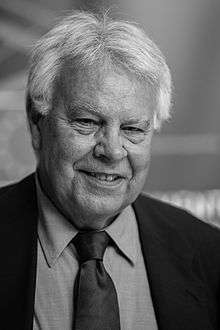
Felipe González
(born 1942) served 1982–1996 -
.jpg)
José María Aznar
(born 1953) served 1996–2004 -
.jpg)
José Luis Rodríguez Zapatero OIC
(born 1960) served 2004–2011
The most recent former prime minister to die was Adolfo Suárez on 23 March 2014, aged 81.
See also
- Prime Minister of Spain
- List of Spanish monarchs
- List of heads of state of Spain
- President of the Republic (Spain)
- List of Spanish regents
This article is issued from Wikipedia - version of the 11/20/2016. The text is available under the Creative Commons Attribution/Share Alike but additional terms may apply for the media files.